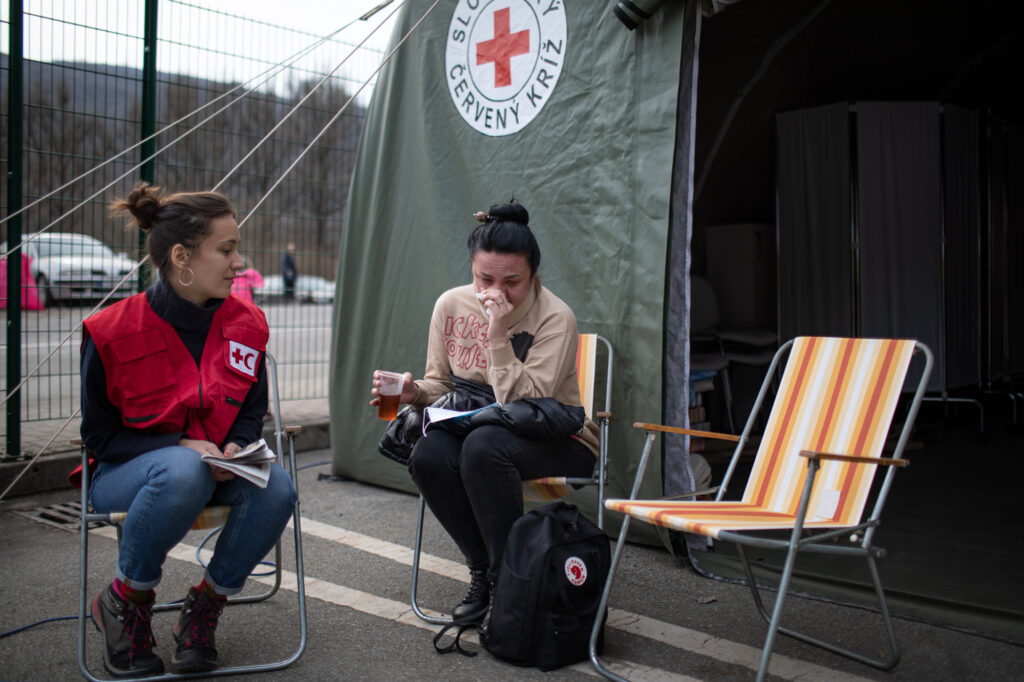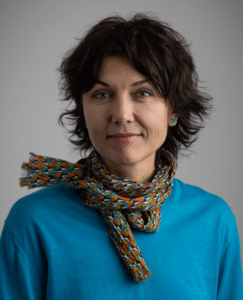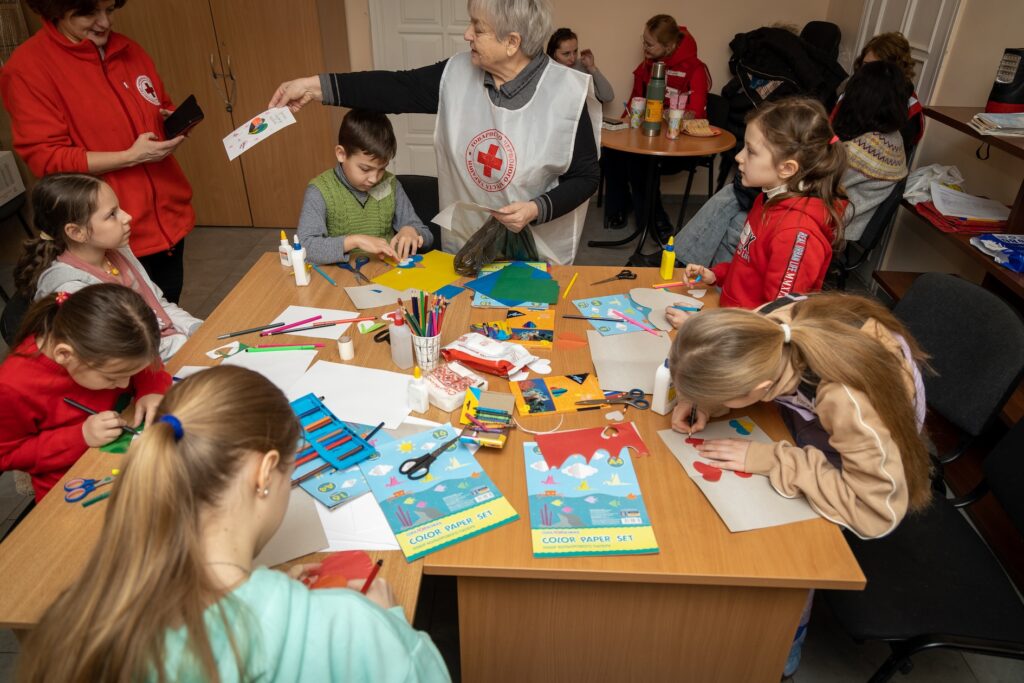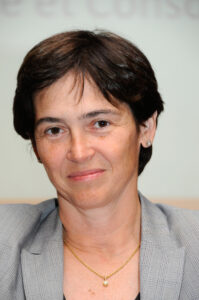The war in Ukraine has brought destruction, death and physical injuries, but it has also left deep psychological wounds. A project by the European Union was set up to provide relief.
Text: Dietmar Schobel
On 24 February 2022, Russian troops invaded Ukraine. Over 3.5 years later, it is estimated that tens of thousands of soldiers have been killed on both sides, with hundreds of thousands injured. And according to the Red Cross Red Crescent (RCRC) Movement, “since the escalation of the international armed conflict in Ukraine … more than 12,000 civilian men, women and children” have been killed, with civil infrastructure and homes suffering large-scale destruction. “Almost 4 million people are internally displaced within Ukraine, and over 6 million more people – primarily women, children and older adults – are refugees in other countries.”

“As early as March, the European Union began to provide medical evacuation for injured or seriously ill people, for treatment at hospitals in the EU and the European Economic Area (EEA),” says Isabel de la Mata, formerly Principal Advisor for Health and Crisis Management at the Directorate General for Health and Food Safety of the European Commission. Besides this, over 155,000 tonnes of in-kind assistance, including medical supplies, mobile hospitals, ambulances and other essential items have been delivered to Ukraine through the EU Civil Protection Mechanism. Displaced people from Ukraine have been granted collective temporary protection by the EU since March 2022. And last June this deadline was extended to March 2027 by the European Council.
Timely psychological first aid
The war in Ukraine has brought extreme psychological suffering for those affected. “We wanted to contribute to relieving this as far as possible and therefore acted swiftly to set up an appropriate project,” explains Isabel de la Mata, describing the motivation behind the EU initiative “Provision of quality and timely psychological first aid to people affected by the Ukraine crisis in impacted countries”. It was realised by the International Federation of Red Cross and Red Crescent Societies (IFRC), supported by a total of 31.2 million euros. Of this, 23.2 million euros were from the EU4Health programme and eight million from the European Union Asylum, Migration and Integration Fund. The project was launched in June 2022 as the biggest initiative for mental health and psychosocial support (MHPSS) ever organised by the EU and the very first within Europe. Overall, since February 2022 the EU has invested more than 100 billion euros in financial, humanitarian and military assistance to Ukraine.
The project aimed to deliver psychological first aid and also mental health and psychosocial support to displaced people.
GANNA GOLOKTIONOVA, THE RED CROSS RED CRESCENT MOVEMENT MHPSS HUB

“First and foremost, the project aimed to deliver psychological first aid and also mental health and psychosocial support to displaced people,” explains Ganna Goloktionova, who is herself from Ukraine and responsible for the initiative at “The Red Cross Red Crescent Movement MHPSS Hub”. 90 helplines and other platforms were established, providing help to approx. 600,000 refugees from Ukraine and other nations. Measures ranged from offering basic psychosocial support through to facilitating access to specialised mental healthcare. 28 national societies that supply help for people displaced by the war in Ukraine were integrated into the project – from the Red Cross in Belgium to the same institution in Ukraine itself.
Those who were displaced received in-person individual and group counselling and could take part in psychoeducational workshops. Furthermore, mobile clinics were set up and operated for their use. Needs varied throughout the duration of the project, with activities such as sports and games for children, peer support for young people, self-defence for women, art and language courses or knitting groups, dance nights and much more all being added. Overall, the project aimed to facilitate new social bonds for refugees, combat isolation to counteract the disruption of old ties, and provide a space for dealing with shared war-related experiences and for receiving support. The refugees also learned new skills in a process of self-empowerment. In addition, the project focused on supporting and empowering the helpers – both voluntary and employed.
Help for the helpers

Workers in the 28 participating countries underwent practice-oriented training to show how those affected could be helped by the provision of psychological first aid with a systematic approach on the basis of verified knowledge. In addition, there was special assistance on offer to help these workers if the situation became too much for them. The spectrum ranged from face-to-face counselling and supportive supervision, as well as group sessions, through to recreational and psychoeducational activities aimed at reducing stress and mitigating burnout among first responders. “As a rule, those who accompany and provide everyday care for people who are affected by the death of their family, injuries, constant fear, terrifying experiences and the loss of their home and homeland will themselves need time and space to process all of this as well. They need support to prevent burnout, and organisations should address these risks to mental health and wellbeing in good time,” says Ganna Goloktionova: “As part of the EU project we were able to offer this in a structured form that is suitable for additionally taking pressure off the helpers and strengthening them in their voluntary or professional work. We set up support on a team level, and advocated for organisational responsibility to protect the wellbeing of volunteers and staff.”
We have seen that it is necessary to respond flexibly to what is required.
ISABEL DE LA MATA, FORMERLY PRINCIPAL ADVISOR FOR HEALTH AND CRISIS MANAGEMENT AT THE DIRECTORATE GENERAL FOR HEALTH AND FOOD SAFETY OF THE EUROPEAN COMMISSION

At the end of October 2025, the project “Provision of quality and timely psychological first aid to people affected by the Ukraine crisis in impacted countries” will come to an end. What has been learned during this time? “The challenges and expectations have changed throughout the project, and we have seen that it is necessary to respond flexibly to what is required,” replies Isabel de la Mata. A second aspect is that supporting measures have to be adapted to the needs of those affected, and it is necessary to work with them to plan and implement the measures: “Last but not least, trust in the local project workers is absolutely vital here. They are best placed to know what is possible and important in their respective country, and a difference must be made here – for instance – between Portugal and Romania, just to give two examples.”
What will remain?
Ganna Goloktionova hopes that the project will have sustainable effects even after it has ended officially: “We have prepared educational materials, practical tools and guides for mental health and psychosocial support which remain relevant in Ukraine and can be used in other regions of the world in the future. And we expect that the people who have received the appropriate training for giving psychological first aid or facilitating courses themselves will continue to do this in their respective roles in their own countries.”
And the need will continue – as will the need for financial support to offer measures that are aimed at relieving mental suffering and healing invisible wounds.
FACTS & FIGURES
Within the EU project “Provision of quality and timely psychological first aid to people affected by the Ukraine crisis in impacted countries”:
41,095 health professionals, volunteers, first aid responders and other professionals were trained to provide psychological first aid and mental health and psychosocial support (MHPSS); 2,054 of whom speak Ukrainian or Russian
90 helplines and other service platforms were established or expanded with MHPSS services
29,788 staff members and volunteers as frontline responders received mental health and psychosocial support
National Red Cross Societies from 28 countries participated in the project. Specifically, these countries are: Belgium, Bulgaria, Croatia, Czech Republic, Denmark, Estonia, Finland, France, Germany, Greece, Hungary, Iceland, Ireland, Italy, Latvia, Lithuania, Luxembourg, Republic of Moldova, Montenegro, Norway, Poland, Portugal, Romania, Slovakia, Slovenia, Spain, Sweden and Ukraine. The project strengthened cooperation between these national organisations and also between them and the International Federation of Red Cross and Red Crescent Societies and the Red Cross Red Crescent Movement.
WHAT IS PSYCHOLOGICAL FIRST AID?
Psychological first aid is a method of helping people in distress so they feel calm and supported in coping with their challenges. It is a way of helping someone to manage their situation and make informed decisions. The WHO model “Look, Listen and Link” is one possible approach to psychological first aid. It includes, for example, looking for who needs help, accepting others’ feelings, paying attention and listening actively, and linking people to access services and other help.
Source: A Guide to Psychological First Aid for Red Cross and Red Crescent Societies, IFRC Reference Centre for Psychosocial Support, Copenhagen, 2018.
IMPRESSIONS FROM THE PROJECT
“Being a helpline operator gives me the feeling that despite my age and financial situation, I can still help in some way. To realise that I’m really helping and contributing is the most important aspect of this job for me. I don’t do much, but we are all cogs in this big machine, and it is nice to realise this through my work.”
Natalya Krasulya, a student from Ukraine in Slovakia, helpline operator for the Slovak Red Cross
“The Psychological First Aid training was very useful for me because it gives practical skills that we can use in the future, and not just know as theory. It should be taught to everyone who works and interacts with people.”
Oleksandra Domadievska, staff member and volunteer, Spanish Red Cross
“I believe that supporting volunteers is very important right now. And to appreciate the importance of their work. They work so hard. It inspires me, it inspires our entire community.”
Vlad, chief specialist in volunteer and youth development, Ukrainian Red Cross
“We had a huge amount of help from the Red Cross. Both moral support and psychosocial help. We could always call them at any time and they would tell us where we needed to go. They would help us fill out documents or get a doctor when the children were sick. We could turn to them and get help with any issue we had.”
A mother from Ukraine who fled to Germany with her children.
Source: https://www.ifrc.org/our-work/health-and-care/community-health/mental-health-and-psychosocial-support/eu4health-and-ifrc accessed on 19 September 2025
